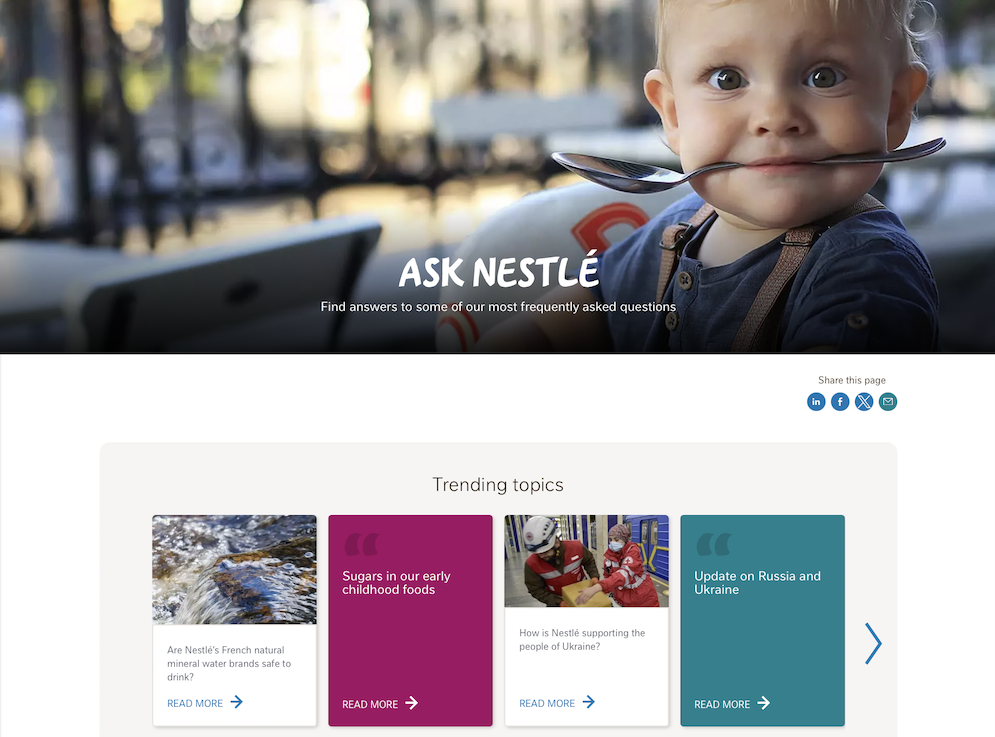How corporate digital teams are navigating a transformative moment

"Decisions made now will set this area of communication on a new course, and we’re convinced that corporate digital communication is entering its period of greatest relevance."
We recently gathered with corporate digital communicators from a range of companies and sectors at roundtable meetings in London and New York. On the agenda: how industry experts are keeping up with AI search, the future of the corporate website, and strategies for success in a polarised world. Here are some of the key insights from the discussion.
1. It's time to invest in content
"Before, there was an argument that 'nobody visits this page, so why should we have it'… that's no longer the case in the age of AI search."
Over the past few years (and still ongoing) there has been a trend to strip back editorial content and take on a “less is more” approach on corporate digital channels. AI search has completely changed this.
AI bots read and index every page, and if your company is not providing its stance on a particular issue, visitors will get a different story that is beyond your control.
Top corporate digital teams are investing in rich editorial content that shares authentic stories from across the business, while also feeding AI search engines.
As one person succinctly put it, "Editorial is back!"
See Jonathan's article, "Five ways to win at AI search (and not become obsolete)" for more detail.
2. Be proactive, not reactive
"We constantly ask, 'what content should be on the website?'"
When it comes to determining which topics need to be addressed on corporate digital channels, start by identifying the issues that stakeholders care about the most and are most material to your business, and using that as a compass.
Take stock by looking through visitor survey data, search and contact logs from the corporate website, and any red flags on Reddit and social media. Also consider asking AI chatbots, including ChatGPT, Perplexity and Google AI Mode for key topics resulting from common questions about your company. This will enable you to become proactive, not reactive.
Bowen Craggs' AI search visibility deep dive service will identify your current strengths and weaknesses and provide practical recommendations for improvement. Contact Tom Golden for more details.
3. Create FAQ banks and policies and positions pages
"Relying on a trusted group of core journalists is no longer how it works – it's more important than ever that we tell our own story"
FAQ banks and policy and positions pages are a great way to address the big issues that are relevant to the company, via your most powerful owned media channel: the corporate website.
Share of voice and earned media continues to be important, but so is having a definitive stance on your website on all issues that matter to the business, so that stakeholders and AI bots can refer back to it.
See the examples from Amazon "Policy and Positions page", GSK "Policy and positions" and Nestlé "Ask Nestlé".

Refer to Nestlé's "Ask Nestlé" section for transparent answers to hot topic questions.
4. It's ok to talk about legacy issues
"Content auditing is more important than ever"
How do you know when to remove old content from the corporate site, and what should you keep?
Our view is that out-of-date content can be removed, but official historical information, such as press releases, and statements about legacy reputation issues, needs to have a deep archive. It is also important to make it clear when content was last updated.
AI bots rate fresh content highly, but there is evidence that older information is also valued by AI, especially in cases where fresher or more relevant content doesn’t exist.
See the example from Nestlé, which covers historical issues from the 1970s and has strong visibility in AI search.
5. Seize the moment
"In 20 years, I've never seen the CEO take so much interest in the corporate website."
Our final takeaway is that the combination of AI search, sociopolitical polarisation and a fragmenting medial landscape means that the corporate website is more strategically important than ever, and top-performing digital communications teams are using this as evidence to get CEO buy-in and leverage more resources.
As we say in our latest Index Snapshot report, a bright, new future for corporate digital communications isn’t just a happy idea. For the leaders in the Corporate Digital Communications Index, that future is already here.